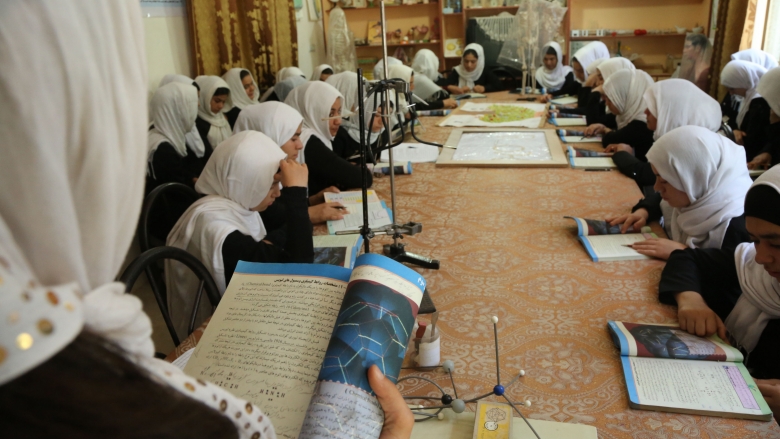HERAT CITY, Herat Province – Computer science teacher Freshta stands in front of a class of 11th grade students at Mawlana Hatefi Girls’ High School. As the students look at a projected screen, she demonstrates how to use the ‘insert’ menu of a software application.
“Students study their computer lessons with more enthusiasm because we have enough computers in our class now and every student gets a chance to practice on one,” says Freshta. “The learning environment has dramatically improved in Mawlana Hatefi High School since 2009.”
Freshta has every reason to be proud of her students. The school recently won a software competition among all high schools in Herat Province. “Students from our school developed a software application that easily explained the power circuit,” says Tamana, a student. The school computer laboratory is equipped with wireless internet service that students use to research their school projects. “If we did not have access to a well-equipped computer lab and internet service, it would have been very difficult for us to win the first position in the software competition,” she says.
Mawlana Hatefi Girls’ High School is located in the heart of Herat city in western Afghanistan. It separated from the boys’ school of the same name in 2002 and has since grown to an enrollment of over 6,000 female students. Students attend the school in three shifts throughout the day, studying in 114 classrooms.
Enhanced academic quality
The school has received two Quality Enhancement Grants (QEGs), one in 2009 and one in 2012, from the Education Quality Improvement Project (EQUIP). EQUIP, now in its second phase, seeks to increase equitable access to quality basic education, especially for girls. It is implemented by the Ministry of Education and was first funded by the International Development Association (IDA), the World Bank Group’s fund for the poorest countries. The Afghanistan Reconstruction Trust Fund (ARTF) has taken over funding as co-financier of the project.
The QEGs, totaling 416,000 Afghanis (more than $6,000), have allowed the school to purchase state-of-the art laboratory equipment for the science facilities, computers for the computer laboratory, and books for the library. These new resources have dramatically enhanced the academic quality of the school, and in turn increased the enthusiasm for learning and commitment of students to their studies.

